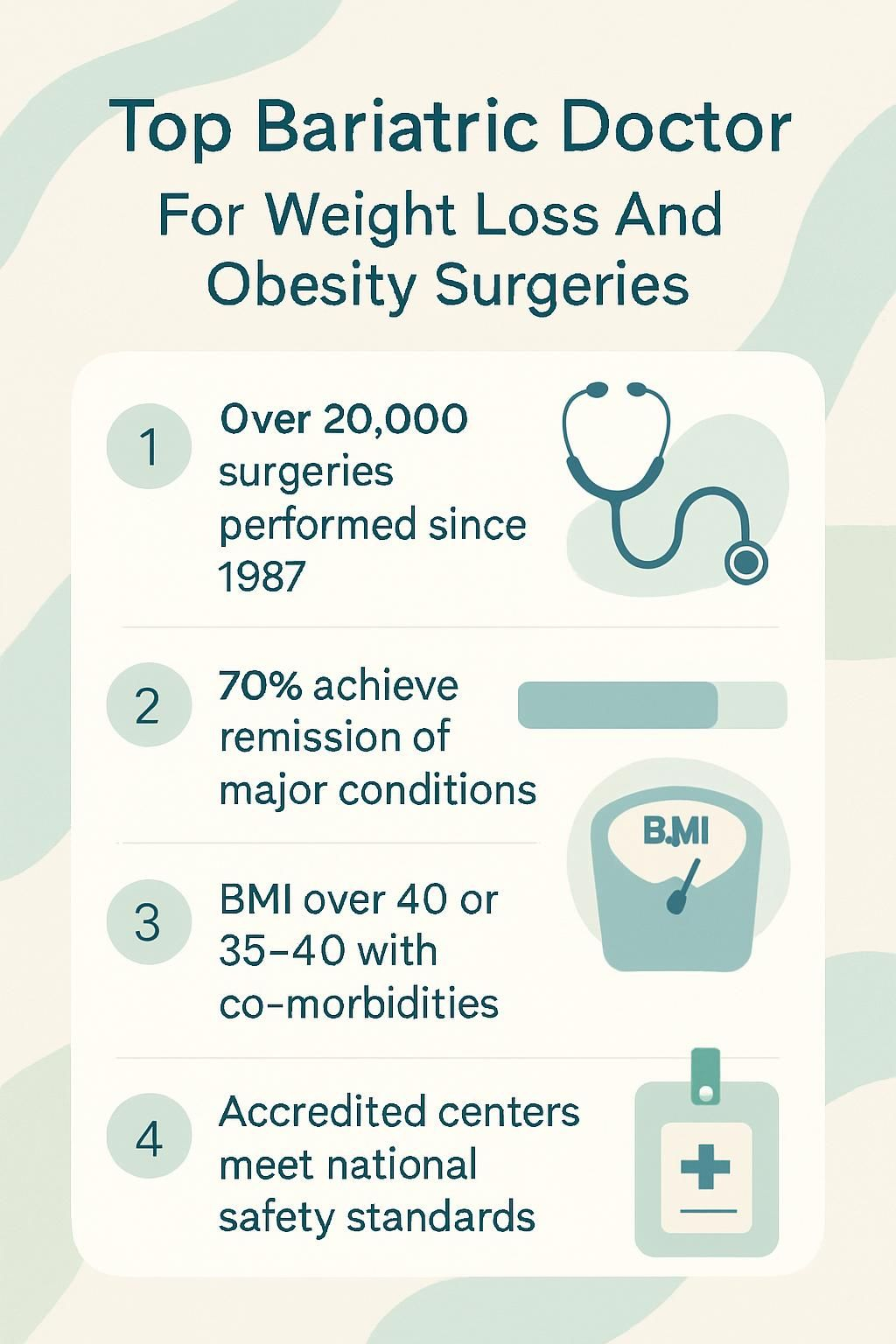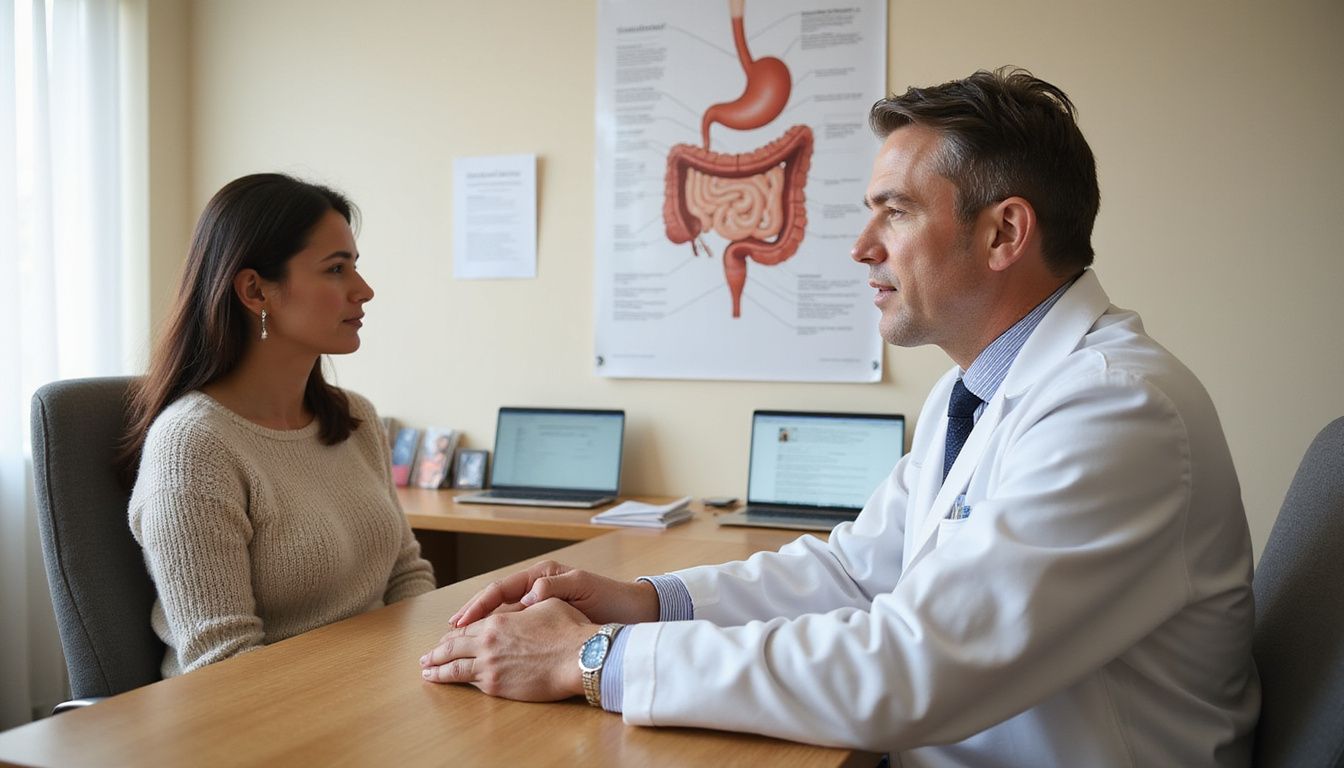Top Bariatric Doctor For Weight Loss And Obesity Surgeries
Our Nutrition Assistant AI Suite will transform your body. You will lose fat, get toned, and build muscle. Gain confidence and optimal health.
If diet and exercise have not helped you lose weight, you are not alone. A bariatric surgeon can guide medical weight management and bariatric surgery to improve health and quality of life. These options can reduce obesity-related diseases and help with lasting weight loss.
This guide explains what a bariatric doctor does, how gastric bypass and sleeve gastrectomy work, and what makes top programs like Scripps strong choices. You will learn how to evaluate surgeons, what to ask during a consult, and how to plan your next steps with confidence.
Take a moment to see your options and decide what fits your goals. Read on to learn how to choose the best bariatric doctor for your journey.
Key Takeaways
- Board-certified surgeons at Scripps and Wittgrove have performed more than 20,000 minimally invasive weight-loss surgeries since 1987, which supports expertise and low complication rates.
- Accredited programs, such as Scripps, hold MBSAQIP Comprehensive Center status. This means they meet strict national standards for safety and quality in surgical and non-surgical care.
- Procedures like Roux-en-Y gastric bypass and sleeve gastrectomy can lead to remission of type 2 diabetes, high blood pressure, and sleep apnea in most patients.
- Bariatric surgery candidacy usually requires a BMI of 40 or higher, or a BMI of 35 to 40 with conditions like diabetes or hypertension.
- Long-term support, including monthly support groups and one-on-one counseling, improves the chances of keeping weight off after surgery.

What Does a Bariatric Doctor Do?

A bariatric doctor treats obesity and related conditions using surgery or non-surgical care. These weight loss experts design a plan that fits your medical needs, your goals, and your lifestyle.
What is a bariatric doctor?
Bariatric doctors focus on treating excess body weight and the diseases linked to it. They evaluate you for weight loss surgery, such as gastric bypass or sleeve gastrectomy, and manage related illnesses like type 2 diabetes, high blood pressure, metabolic syndrome, and sleep apnea.
Leaders like Dr. Alan Wittgrove helped develop modern laparoscopic gastric bypass. At centers such as the Wittgrove Bariatric Center, a full team supports you. They review your health history and body mass index, which is a height and weight measure. The team checks if surgery or medical care fits best.
Your care team may include nurses, psychologists, fitness coordinators, insurance analysts, surgical schedulers, and patient liaisons. The bariatric doctor oversees your progress before and after surgery and coaches you on healthy habits through weight management services.
How do bariatric doctors specialize in weight loss surgeries?
These surgeons complete extensive training in both medicine and surgery. They gain experience with procedures such as gastric bypass, sleeve gastrectomy, adjustable gastric band, and duodenal switch.
Surgeons like Dr. Wittgrove have treated thousands of patients with laparoscopic methods since 1987. Scripps surgeons have performed more than 20,000 metabolic and bariatric surgery cases using minimally invasive techniques.
They follow guidance from professional groups such as the American Society for Metabolic and Bariatric Surgery and the MBSAQIP accreditation program. Many also perform revision surgery, such as converting a Lap-Band to a sleeve or bypass when needed. Smaller incisions often mean faster recovery and fewer wound issues, which makes today’s bariatric care safer.
When Should You See a Bariatric Doctor?
If obesity is harming your health or your daily life, a bariatric consult can help. Medical and surgical options can lead to lasting results.
When is weight loss a serious concern?
Weight loss becomes more urgent if you are 100 pounds or more over your ideal weight, or your BMI is 40 or higher. A BMI of 35 to 40 with serious conditions, like diabetes, hypertension, or obstructive sleep apnea, also signals a need for medical care.
The National Institutes of Health classifies severe obesity as a chronic disease that needs long-term treatment. If medically supervised diet changes and exercise have not worked, it is time to consider other options. Extra abdominal fat can drive inflammation and raise the risk for cardiovascular disease, metabolic liver disease, and fatty liver disease. Bariatric assessment tools help your doctor decide if surgery or other care is right for you.
Which obesity-related health issues require a bariatric doctor?
Common issues include high blood pressure and type 2 diabetes. Severe obesity can affect metabolism and the gastrointestinal tract, leading to hormone imbalances and excess adipose tissue.
If your BMI is 35 to 40 with serious co-morbidities like diabetes or hypertension, you may qualify for bariatric surgery using NIH guidelines. Bariatric doctors also manage dyslipidemia, high A1C, frailty, eating disorders tied to weight changes, and depression that can follow long periods of illness.
“Bariatric surgery reduces long-term risks of life-threatening diseases caused by untreated obesity.”
In my case with type 2 diabetes, meeting a bariatric specialist changed my plan after years of unstable blood sugar. Surgery can improve complex metabolic conditions and support a longer, healthier life.
What if diet and exercise haven’t worked?
If supervised diet and activity programs have not led to meaningful weight loss, you may qualify for bariatric surgery. Your doctor will review everything you tried, including nutrition therapy and any medicines.
Many people work very hard for years without durable results. That pattern is part of why metabolic and bariatric surgery can be helpful. Scripps and the Wittgrove Bariatric Center offer free orientation sessions so you can compare options. Support services, such as lifestyle coaching, begin even before you choose surgery.
Financial counselors at MBSAQIP-accredited centers can help explain health insurance coverage. If a Lap-Band failed, experienced surgeons can convert it to a sleeve or bypass, usually performed laparoscopically, to help you reach long-term goals.
Common Types of Bariatric Surgeries
Bariatric surgeries help lower human body weight and treat diseases related to obesity. Each procedure changes how your stomach or small intestine handles food, which supports weight control and diabetes management.
What is gastric bypass surgery?
Gastric bypass is a primary option for severe obesity and related conditions. Many centers perform the Roux-en-Y gastric bypass with laparoscopy, which uses small cuts and a camera. In 1993, Dr. Wittgrove performed the first laparoscopic gastric bypass.
During this surgery, the surgeon creates a small stomach pouch and connects it to the small intestine. Food bypasses most of the stomach and the duodenum. This limits how much you can eat and changes calorie absorption. Scripps surgeons report low complication rates with this approach.
Accredited programs pair surgery with nutrition counseling, lab checks, monthly support groups, and long-term follow-up. If diets have failed, this metabolic surgery may help. A friend of mine felt less hunger soon after a Roux-en-Y at an accredited center, which they linked to lower ghrelin, a hormone that signals hunger.
How does sleeve gastrectomy work?
During sleeve gastrectomy, surgeons remove about three quarters of the stomach, leaving a thin sleeve. Smaller capacity reduces meal size. It also lowers levels of hunger hormones made in the stomach lining.
This minimally invasive procedure is performed laparoscopically, so recovery can be faster and less painful. Many patients see major weight loss and better metabolic health. If a gastric band did not succeed, surgeons can perform a sleeve as a revision. Accredited centers provide education and support before and after surgery to help you keep a healthy weight.
What is an adjustable gastric band?
An adjustable gastric band, often called Lap-Band, is placed around the upper stomach using laparoscopy. The band creates a small pouch so you feel full sooner and eat less. Many people like that it is a minimally invasive procedure and is usually performed with local or general anesthesia and small incisions.
Regular follow-up is important. Doctors adjust the band’s tightness to match your progress and symptoms. If problems arise, such as weight regain or side effects, surgeons at accredited centers can convert the band to a sleeve or a bypass. In my case, regular check-ins and group support were key to making the device work well, including for teens who need close monitoring.
What does a duodenal switch involve?
A duodenal switch at Scripps uses laparoscopy and combines a sleeve gastrectomy with an intestinal bypass called SADI, which stands for Single Anastomosis Duodenal-Ileal bypass. The stomach is reduced, then food is rerouted past much of the small intestine. You feel full faster and absorb fewer calories.
This option can help people with severe obesity and difficult conditions like high LDL or diabetes that did not improve with other procedures. Accredited teams follow national guidelines to choose the right candidates. Many patients see strong weight loss and better blood sugar and cholesterol after a duodenal switch.
What Are Non-Surgical Weight Loss Options?
You can begin with medical weight management if you prefer to avoid surgery or need help preparing for it. These programs address eating, activity, and medicines in one plan.
How do medically supervised weight loss programs help?
Supervised programs give you guidance from internists and nutritionists. Plans are based on your waist, height, medical risks, and lab results. They also consider mental health and your daily routine.
Scripps and Wittgrove offer structured programs for people who are not ready for bariatric surgery. You receive meal plans, exercise goals, and behavior coaching that address hunger signals and self-care. Doctors track progress through regular visits to ensure safety and effective fat loss.
Insurance often covers care at accredited centers that meet MBSAQIP standards. These steps also prepare you for surgery if you later qualify. Many people find nutrition counseling crucial for long-term success.
What role does nutrition and lifestyle counseling play?
Nutrition and lifestyle counseling build the daily skills that make weight loss stick. At Wittgrove, dietitians and fitness coordinators help you set realistic goals and handle common barriers like cravings or low motivation. Scripps offers similar support online and in person.
Monthly support groups and one-on-one coaching make it easier to stay on track. Accredited programs create personalized meal and activity plans so your care fits your needs. I found the individual sessions helpful, because feeling heard made change easier.
Which medications support weight management?
Doctors may prescribe FDA-approved weight-loss medicines if diet and exercise have not worked well enough. Options may include phentermine, liraglutide, or semaglutide, depending on your health history and goals.
Medication is combined with counseling for better results. Medical supervision is key, since doses and side effects need monitoring. Insurance staff at accredited programs can explain coverage. In my experience with internal medicine, regular check-ins helped fine-tune the dose so my hunger signals improved safely over time.
New Advances in Bariatric Surgery
Recent advances make surgery less invasive and recovery faster. Modern tools also improve precision in complex cases.
What are minimally invasive laparoscopic surgeries?
Laparoscopic surgery uses a camera and small tools through tiny incisions. Surgeons apply this approach to gastric bypass, sleeve gastrectomy, adjustable gastric band, and SADI.
Dr. Wittgrove’s first laparoscopic gastric bypass in 1993 marked a new era. Today, centers such as Scripps specialize in these methods and have completed more than 20,000 cases. Benefits often include smaller scars, less pain, shorter hospital stays, and quicker return to normal activities.
Most revision procedures now use minimally invasive methods at accredited centers. Many patients appreciate both the results and the quicker recovery. From my work with patients, many felt their hunger signals settled sooner after modern laparoscopic procedures.
How do robotic-assisted bariatric surgeries work?
Robotic-assisted surgery uses a robotic system controlled by a surgeon at a console. The robot’s arms hold instruments and follow the surgeon’s precise movements. This can allow for smaller cuts and gentle handling of tissues.
Robotic assistance can be helpful for complex or revision surgeries. Some patients schedule video visits to learn if this approach fits their case. Surgeons often report faster recovery and fewer complications with robotic systems at accredited centers. Watching a robotic procedure showed me just how steady and exact these tools can be.
Why Consult a Bariatric Doctor?
A bariatric doctor can help you treat obesity with a plan that fits your health and life. Personalized care improves safety and long-term results.
How do personalized treatment plans improve outcomes?
Personalized plans begin with a full review of your health history, goals, and co-morbidities. Nurses, psychologists, internists, and insurance analysts help shape your plan so it is realistic and safe.
Accredited centers select options that fit best, whether surgical or non-surgical. You receive lifestyle coaching, nutrition counseling, and routine check-ins. Support groups and education improve long-term weight management and help flag problems early.
What health benefits result from bariatric care?
Bariatric care can improve many obesity-related conditions. High blood pressure, type 2 diabetes, and sleep apnea often get better or even go into remission after significant weight loss.
Many accredited centers report strong improvements in these diseases and less reliance on medicine. People also report better energy and mental well-being. After losing about 10 percent of my weight with medical care, my blood sugar and stamina improved within months.
How does support help with long-term weight management?
Monthly post-surgery support groups at Scripps and Wittgrove help you stay motivated. Sharing tips and struggles with peers makes the journey easier. One-on-one coaching helps you build lasting habits and set step-by-step goals.
Both virtual and in-person options are available. Ongoing education from accredited centers keeps you informed and confident. After my sleeve gastrectomy, hearing others’ success stories pushed me to keep exercising even during tough weeks.
Bariatric Surgeon Credentials and Quality Standards
Picking a skilled bariatric surgeon with strong credentials improves safety and results. Quality standards also influence recovery and long-term success.
Why choose board-certified bariatric surgeons?
Board-certified surgeons meet national standards and complete ongoing education. At programs like Scripps and Wittgrove, surgeons maintain certification, which supports current techniques and safety.
Experience matters. Surgeons who have completed thousands of procedures often report lower complications. As a patient, knowing my surgeon was board-certified increased my confidence and comfort throughout the process.
What is the MBSAQIP and why is it important?
The Metabolic and Bariatric Surgery Accreditation and Quality Improvement Program recognizes centers that provide high-quality, comprehensive care. Scripps is an MBSAQIP-accredited Comprehensive Center, which reflects strict safety and support standards.
Accreditation means your team follows proven practices and tracks outcomes. MBSAQIP centers usually offer both surgical and non-surgical options and include nutrition, mental health, and medical support. Many insurers and referring physicians prefer these programs due to the high standards. Choosing an MBSAQIP-accredited program made a clear difference in my own care.
What Should You Ask Your Bariatric Doctor?
Prepare a short checklist for your consult. Clear questions can save time and lead to better decisions.
Am I a candidate for bariatric surgery?
You may qualify if your BMI is 40 or higher, or if your BMI is 35 to 40 with conditions such as type 2 diabetes, high blood pressure, or sleep apnea. Accredited centers like Scripps and Wittgrove use standard tools to evaluate candidacy.
Your team will confirm that supervised diet efforts did not work. You will also meet with medical, psychological, and nutrition staff. Insurance analysts can help you review coverage. I found the free orientation sessions helpful for comparing surgical and non-surgical options.
What are the risks and benefits of surgery?
Bariatric surgery often brings major and lasting weight loss. Conditions such as diabetes, sleep apnea, and hypertension can improve or go into remission. Laparoscopic and robotic-assisted techniques usually mean shorter hospital stays and quicker recovery.
Risks vary by procedure and health history. They can include infection, blood clots, bleeding, or stomach leaks. Some patients may need revision surgery later. Accredited centers provide a tailored risk review and close follow-up to lower complication risks. My surgeon walked me through each risk, which helped me feel prepared.
What post-surgery support will I get?
Most accredited centers provide monthly support groups and regular check-ins. Scripps hosts in-person meetings at Scripps Memorial Hospital in La Jolla and offers virtual options as well. Teams often include psychologists, fitness coordinators, and patient liaisons.
One-on-one coaching covers nutrition, movement, and self-care. Your progress is tracked closely, and resources adjust as your needs change. Compassionate support is a key part of long-term success.
How to Choose the Best Bariatric Doctor
Compare experience, credentials, and support services. Patient reviews and outcomes offer useful clues about real-world results.
How to evaluate experience and qualifications?
Look for board certification and MBSAQIP-accredited centers. Dr. Wittgrove has performed more than 11,000 bariatric procedures since 1987. Scripps surgeons have completed more than 20,000 surgeries, and the Wittgrove Bariatric Center reports over 4,500 procedures.
Ask about surgeon-specific complication rates and outcomes. Experience with revision surgery can be helpful for complex cases. National recognition for safety and innovation often signals high-quality care.
Why read patient reviews and success stories?
After you confirm a surgeon’s experience, reviews can show what day-to-day care feels like. Patients often describe comfort, staff support, and real results at Scripps and Wittgrove. Social platforms like Facebook, YouTube, and Obesity Help feature many of these stories.
These insights help set expectations and offer motivation during hard weeks. Consistent praise for safety and support programs can point to a strong community that improves your odds of success.
What support programs should be available?
Top bariatric centers offer comprehensive support. Scripps runs monthly support groups in La Jolla and also supports regional meetings in Las Vegas, Palm Springs, Yuma, and Alaska. Many sessions are available virtually.
Expect one-on-one coaching plus nutrition and fitness counseling. Access to mental health support and patient liaisons is important for recovery and weight maintenance. Accredited centers build long-term success into every care plan.
Where Can You Get Bariatric Surgery?
Specialized centers and hospitals across the United States offer bariatric surgery. Accreditation helps you judge safety and quality.
What are specialty bariatric centers?
These centers focus only on weight loss care. Many hold Comprehensive Center accreditation for high standards. The Wittgrove Bariatric Center has completed thousands of laparoscopic procedures since 1987.
Expect free orientations, detailed assessments, and structured follow-up that includes support groups and lifestyle coaching. Both in-person and virtual consults are common. After my own surgery at a specialty center, monthly groups kept me accountable and motivated.
Which hospitals have accredited bariatric programs?
Scripps in San Diego holds MBSAQIP accreditation as a Comprehensive Center. The team uses evidence-based protocols and provides detailed follow-up care.
The Wittgrove Bariatric Center, led by Dr. Alan Wittgrove, is also MBSAQIP-accredited and known for a focus on laparoscopic surgery. During a family member’s visit, staff explained options clearly and offered helpful materials. Check local listings to find accredited programs near you.
What Are the Long-Term Results of Bariatric Surgery?
Many patients keep weight off for years after bariatric surgery. Health and daily life often improve alongside weight loss.
How effective is sustained weight loss?
Most patients see significant and durable weight loss. Scripps reports high success rates and low complications over more than 20,000 surgeries. The Wittgrove Bariatric Center has supported more than 11,000 people since 1987.
Support matters. Ongoing groups and coaching help you maintain new habits. After I joined post-surgery groups, sticking with changes felt simpler and my confidence grew. Weight loss also improves conditions like diabetes and hypertension, which supports long-term wellness.
How does surgery improve obesity-related conditions?
Weight loss after surgery does more than change body size. Many people see rapid gains in health. Blood sugar can improve within weeks, sometimes allowing less medication. My aunt’s A1C fell quickly, and her doctor reduced her diabetes treatment within two months.
Research shows that many patients with high blood pressure improve or reach remission after surgery. Sleep apnea often improves as well, leading to better rest and fewer nighttime events. Regular follow-ups help track these changes and guide medication adjustments.
Can bariatric surgery enhance quality of life?
Surgery often reduces the risks of severe obesity and increases energy for daily activities. Accredited programs like Scripps report high success with careful techniques and thorough follow-up.
Support after surgery also improves quality of life. At centers such as Wittgrove, you work with nutrition, fitness, and mental health experts while joining monthly support groups. People who use comprehensive services have better odds of keeping results for years.
What Patient Resources and Support Are Available?
Helpful resources start before surgery and continue for years. These tools make complex steps easier and keep you connected to care.
How to access online patient forms and consultations?
Contact the Wittgrove Bariatric Center at 800-727-4777 or complete the online patient form with your contact details and preferred times. You can request in-person visits or video appointments when available. Confirm virtual options with the provider’s office.
Fill out forms in advance to save time and help your doctor prepare. During my journey, submitting forms early reduced stress and gave me more one-on-one time with the surgeon. Monthly support groups become an important resource after your first visit.
What are monthly support groups like?
Monthly groups connect you with people who understand your path. Wittgrove offers in-person and virtual sessions, so you can join from many locations. These meetings provide practical advice and consistent encouragement.
Each session also gives access to individual coaching that adapts to your progress. Staff follow up and personalize advice to your goals. Many patients say this community support keeps them moving forward.
Where to find educational materials?
Scripps offers free orientation sessions that explain surgery options and recovery. You can also find detailed articles, videos, and downloadable guides on the Scripps website.
The Wittgrove Bariatric Center provides materials on gastric bypass, sleeve gastrectomy, and revision procedures, plus life after weight loss surgery. Social media pages for Scripps and Wittgrove share tips and research updates. Preparing for surgery in 2022, I reread their nutrition guides many times, which helped each stage feel clearer.
Conclusion
Choosing the right bariatric surgeon can help you reach your weight loss goals and improve your health. At Scripps, experienced teams use advanced, minimally invasive techniques for safe and effective care.
You receive free education, expert guidance, and steady support before and after bariatric surgery. Personalized plans address both medical needs and emotional well-being. High quality standards and strong outcomes make Scripps a trusted option in San Diego for bariatric surgery.
If obesity or related illnesses are holding you back, meeting a top bariatric specialist at an accredited center is a smart next step. Always discuss your health with your physician, and consider a second opinion before any procedure. Sources: American Society for Metabolic and Bariatric Surgery, MBSAQIP, and the National Institutes of Health.
FAQs
1. What qualifications should I look for in a top bariatric surgeon for weight loss and obesity surgeries?
A leading bariatric specialist holds board certification in general surgery, has advanced training in metabolic procedures, and maintains membership with professional groups such as the American Society for Metabolic and Bariatric Surgery. High patient success rates and positive outcomes from published studies also indicate expertise.
2. How do weight loss surgeries performed by experienced bariatric doctors help treat severe obesity?
Bariatric operations like gastric bypass or sleeve gastrectomy reduce stomach size or alter digestion. These changes help patients eat less food while improving blood sugar control. Clinical trials show that these interventions can lead to sustained weight reduction of 25 percent or more over several years.
3. Are there risks or side effects linked to obesity surgeries by bariatric specialists?
All surgical treatments carry risks including infection, bleeding, or nutrient deficiencies. Data from national registries show that complication rates are lower at high-volume centers led by skilled surgeons. Most patients experience improved health but require lifelong follow-up to monitor nutrition.
4. Can you share a personal experience of someone who benefited from seeing a top bariatric doctor?
One patient struggled with severe obesity despite diet changes. After consulting a certified bariatric expert, she underwent sleeve gastrectomy. Over two years, she lost over 100 pounds and reversed her type 2 diabetes. Her story highlights how proper surgical care can transform health when other methods have failed.
Summary:
Selecting a qualified bariatric doctor is essential for safe and effective treatment of severe obesity. Evidence shows that skilled surgeons achieve better results with fewer complications. Weight loss operations can lead to major health improvements when performed by experienced professionals. Personal stories reinforce the value of seeking care from recognized experts.







